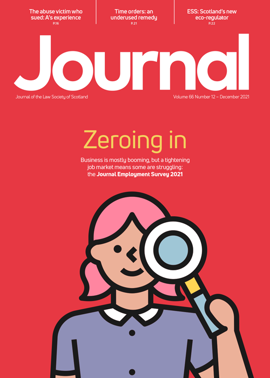Corporate: Will a deal impact on national security?

The National Security and Investment Act 2021 (“NSIA”) changes how foreign investment is dealt with in the UK. With a wide reach, retrospective application (to 12 November 2020), notification and clearance requirements, plus serious consequences if a transaction falls foul of the NSIA, investors and their advisers will require to plan the handling of their transaction carefully and immediately.
Until the NSIA is fully in force (4 January 2022), it works alongside the Enterprise Act 2002, which provides restricted rights to the Government to review transactions. A new Government organisation, the Investment Security Unit (“ISU”), will take over from the Competition & Markets Authority in this area. The new regime is more like that in the US, France and Germany in terms of screening investments, and will let the UK Government review, veto or set requirements in relation to transactions. Recent Government guidance has provided further detail on the application of the NSIA.
Overview of the new regime
Notifiable acquisitions: The NSIA applies in relation to acquisitions which are caused by “trigger events”. An acquisition is a notifiable acquisition where:
- it is of a right or interest in, or to a qualifying asset (including land, tangible moveable property and intellectual property) or qualifying entity (any entity other than an individual);
- the entity/asset being acquired is from, in, or has a connection to, the UK;
- the level of control acquired over the qualifying entity meets or passes a certain threshold.
Government guidance details examples of the threshold criterion as where:
- shareholding stakes or voting rights held pass certain percentages (25%, 50%, or 75%), similarly shares of capital, rights to surplus assets or on winding up (further instances are detailed in the guidance);
- voting rights can block or pass resolutions affecting the entity;
- there results an ability materially to influence entity policy, such as to appoint board members (however the material influence threshold will not apply if, e.g. such a right/interest is already held); or
- “you are able to use a qualifying asset, or direct or control its use, or you are able to do so more than you could prior to the acquisition”. This includes land and IP, and these may be based within or outside the UK (but if outside, a sufficient connection to the UK must exist).
The guidance also highlights that internal restructures/reorganisations may count as trigger events. Similarly, planned acquisitions that have not yet taken place (e.g. where there are signed heads of terms) can be called in. Should the ISU suspect the above criteria are met and national security may be at risk, the transaction can be scrutinised by the Government.
Call-in notice. NSIA applies in relation to the acquisition of rights/interests in a qualifying entity or asset, by allowing the Secretary of State to issue a “call-in notice” for a transaction which falls within the definition of a “trigger event”. A recent statement made under s 3 details that the call-in power will be exercised on a case-by-case basis, but the following factors in relation to national security will be considered: the use of the target, the characteristics of the acquirer and the degree of control to be acquired over the target. The statement notes that the assessment (following the notice) is only to take place where it is reasonably suspected the acquisition could give rise to a risk to national security. The call-in power is only to be used to safeguard the UK’s national security and not to promote any other objectives. Further guidance is expected.
Mandatory notification for “notifiable transactions”. If the acquisition falls within any of the 17 sensitive areas of the economy (defined by regulations under s 6), notification and approval are required, otherwise the acquisition will be void. If cleared, the Government cannot reassess the transaction, unless false or misleading information was submitted. The sensitive areas include civil nuclear, defence and military, but also communications, computing hardware, data infrastructure, energy and transport, among others.
The statement details that qualifying acquisitions of entities which undertake activities “closely linked” to those 17 areas are more likely to be called in. Loans, conditional acquisitions, futures and options are unlikely to be called in as they usually pose little risk to national security. However the guidance notes an exception where rights are exercised for the purpose of preserving or realising the security. Retrospective filing of mandatory notifications is possible, but note that the transaction will be void without Government approval. For transactions which do not qualify under the mandatory regime, a voluntary notification can be submitted to request clearance.
The consequences for failure to notify are severe, with potential criminal and civil penalties including up to 5% of an organisation’s global turnover or £10 million, whichever is greater.
Effect on transactions
When planning and drafting transactional documents for a qualifying acquisition, care will need to be taken to factor for the possibility of the transaction being called in, its unwinding, or any of the other options available to the Government (e.g. restrictions on the number of shares transferred or access to commercial information). More due diligence on investors and the sector involved will be required, and there is a greater likelihood of conditional aspects of deals (e.g. in relation to any auction process or the outcome of a voluntary notification). The NSIA has a wide reach and will not only apply to M&A, corporate restructuring etc, but also in relation to land transactions and IP. Once the NSIA is in force the Government can assess acquisitions retrospectively for up to five years after completion of the relevant transaction, and up to six months after becoming aware of it if it has not been notified.
Regulars
Perspectives
Features
Briefings
- Criminal court: OLRS – life means life
- Corporate: Will a deal impact on national security?
- Intellectual property: IP and AI – the latest
- Agriculture: Securing successor crofting tenant status
- Succession: Back of an envelope – testamentary intent?
- Scottish Solicitors' Discipline Tribunal
- Data protection: Google off the hook
- Property: Beautifully presented tedium
- In-house: Lawyers in uniform
In practice
- Your Law Society of Scotland Council members
- Legal services regulation reform – have your say
- The Word of Gold: Whither goest thou?
- Coaching: help in a fast changing world
- The earlier the better
- Family mediation accreditation: a view from the panel
- The Eternal Optimist: Just to say thanks…
- Appreciation: Albert Vincent Sheehan
- Ask Ash: A broken work circle







